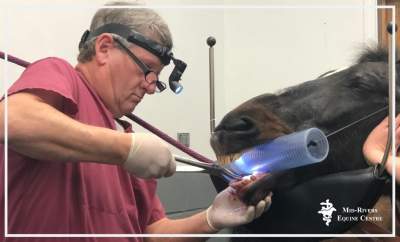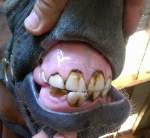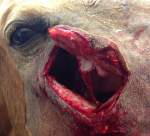Like us, horses require routine dentistry in order to have good overall health. If neglected, poor oral health can lead to tooth decay or infections, leading to pain and the need for advanced equine dentistry.

Sometimes horses may not show symptoms of dental problems, so it is important that you keep an eye on your horse’s oral health. Keep in mind that older horses tend to be more vulnerable to oral problems like infections, gum disease, and lost teeth. Routine dental care can prevent many equine dental problems, but if your horse is experiencing an emergency, like a jaw or tooth fracture contact your veterinarian.
If you’re smelling a foul order from horse’s mouth they may have an undetected dental health problem.
Advanced Equine Dentistry Procedures Performed
During advanced dental procedures, your horse may be required to undergo local anesthesia, nerve blocks, or sedation for a pain-free treatment. Additional diagnostic equipment, like radiographs, may also be used to diagnose and assist in dental procedures. Mid-Rivers Equine Centre performs the following advanced equine dentistry procedures:
- Tooth extractions
- Standing fractured tooth repulsion
- Fractured jaw wiring
- Malocclusion correction
Mid-Rivers Equine Centre is fully equipped to treat dental problems like:
- Periodontal disease
- Fractured jaws or teeth
- Wolf teeth extraction
- Treat milk tooth retention or breaks
Signs Of Dental Problems
If your horse is in need of dental care, they will often express the following signs and symptoms:
- Dribbling food or water
- Eating slowly
- Quidding (Spitting out wet bundles of hay)
- Excess drooling
- Eating with head tilted to one side
- Facial swelling
- Mouth odor
- Nasal discharge

